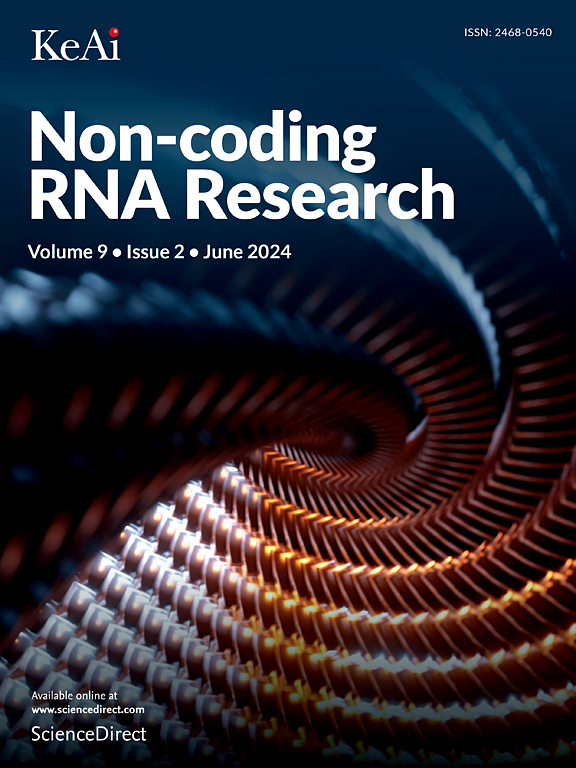Upregulation of long non-coding RNA ENSG00000267838 is related to the high risk of progression and non-response to chemoradiotherapy treatment for cervical cancer
IF 5.9
3区 生物学
Q1 BIOCHEMISTRY & MOLECULAR BIOLOGY
引用次数: 0
Abstract
Cervical cancer (CC) is a global public health concern, primarily caused by persistent infection with oncogenic types of human papillomavirus (HPV). The World Health Organization (WHO) has established a plan to eliminate CC as a public health issue by the year 2100. However, the implementation of the HPV vaccine is impeded by vaccine restrictions and misinformation despite its demonstrated effectiveness. The CC treatment is influenced by the disease stage, with an unfavorable prognosis for those in advanced stages. This study aimed to investigate the potential of long non-coding RNAs (lncRNAs) in CC by identifying and characterizing related lncRNAs, elucidating their regulatory mechanisms and molecular interactions, and analyzing their expression patterns in patients with diverse responses to chemoradiotherapy. Non-stem cells from CC were isolated using flow cytometry sorting and used for total RNA extraction. The RNA was used to build libraries that were subsequently sequenced using the Illumina Nextseq 550.417 lncRNAs that showed differentially expressed between CC patients who responded or not to treatment. Further analysis demonstrated that these lncRNAs significantly interact with several molecules, which play crucial roles in CC progression and therapeutic resistance. Statistical analysis correlated the expression profile of these lncRNAs with treatment efficacy. Three lncRNAs, ENSG00000267838, ENSG00000266340, and FRMD6-AS1, were identified with positive expression related to non-response to chemoradiotherapy and worse progression-free survival in CC patients. Specifically, lncRNA ENSG00000267838 has its up-regulation related to non-response and down-regulation to response to chemoradiotherapy treatment.
长链非编码RNA ENSG00000267838的上调与宫颈癌进展的高风险和对放化疗无反应有关。
宫颈癌(CC)是一个全球性的公共卫生问题,主要由致癌型人乳头瘤病毒(HPV)持续感染引起。世界卫生组织(卫生组织)制定了一项计划,到2100年消除作为公共卫生问题的疟疾。然而,HPV疫苗的实施受到疫苗限制和错误信息的阻碍,尽管它已证明有效。CC的治疗受疾病分期的影响,晚期患者预后不良。本研究旨在通过鉴定和表征相关lncRNAs,阐明其调控机制和分子相互作用,并分析其在不同放化疗反应患者中的表达模式,探讨长链非编码rna (long non-coding rna, lncRNAs)在CC中的潜力。用流式细胞术分选分离CC非干细胞,提取总RNA。该RNA用于构建文库,随后使用Illumina Nextseq 550.417 lncrna进行测序,这些lncrna在对治疗有反应或无反应的CC患者中表达差异。进一步的分析表明,这些lncrna与几个分子显著相互作用,这些分子在CC的进展和治疗耐药性中起着至关重要的作用。统计分析表明这些lncrna的表达谱与治疗效果相关。三个lncrna, ENSG00000267838, ENSG00000266340和FRMD6-AS1,在CC患者中被鉴定为阳性表达,与放化疗无反应和更差的无进展生存有关。具体而言,lncRNA eng00000267838在放化疗无反应时上调,在放化疗有反应时下调。
本文章由计算机程序翻译,如有差异,请以英文原文为准。
求助全文
约1分钟内获得全文
求助全文
来源期刊

Non-coding RNA Research
Medicine-Biochemistry (medical)
CiteScore
7.70
自引率
6.00%
发文量
39
审稿时长
49 days
期刊介绍:
Non-coding RNA Research aims to publish high quality research and review articles on the mechanistic role of non-coding RNAs in all human diseases. This interdisciplinary journal will welcome research dealing with all aspects of non-coding RNAs-their biogenesis, regulation and role in disease progression. The focus of this journal will be to publish translational studies as well as well-designed basic studies with translational and clinical implications. The non-coding RNAs of particular interest will be microRNAs (miRNAs), small interfering RNAs (siRNAs), small nucleolar RNAs (snoRNAs), U-RNAs/small nuclear RNAs (snRNAs), exosomal/extracellular RNAs (exRNAs), Piwi-interacting RNAs (piRNAs) and long non-coding RNAs. Topics of interest will include, but not limited to: -Regulation of non-coding RNAs -Targets and regulatory functions of non-coding RNAs -Epigenetics and non-coding RNAs -Biological functions of non-coding RNAs -Non-coding RNAs as biomarkers -Non-coding RNA-based therapeutics -Prognostic value of non-coding RNAs -Pharmacological studies involving non-coding RNAs -Population based and epidemiological studies -Gene expression / proteomics / computational / pathway analysis-based studies on non-coding RNAs with functional validation -Novel strategies to manipulate non-coding RNAs expression and function -Clinical studies on evaluation of non-coding RNAs The journal will strive to disseminate cutting edge research, showcasing the ever-evolving importance of non-coding RNAs in modern day research and medicine.
 求助内容:
求助内容: 应助结果提醒方式:
应助结果提醒方式:


